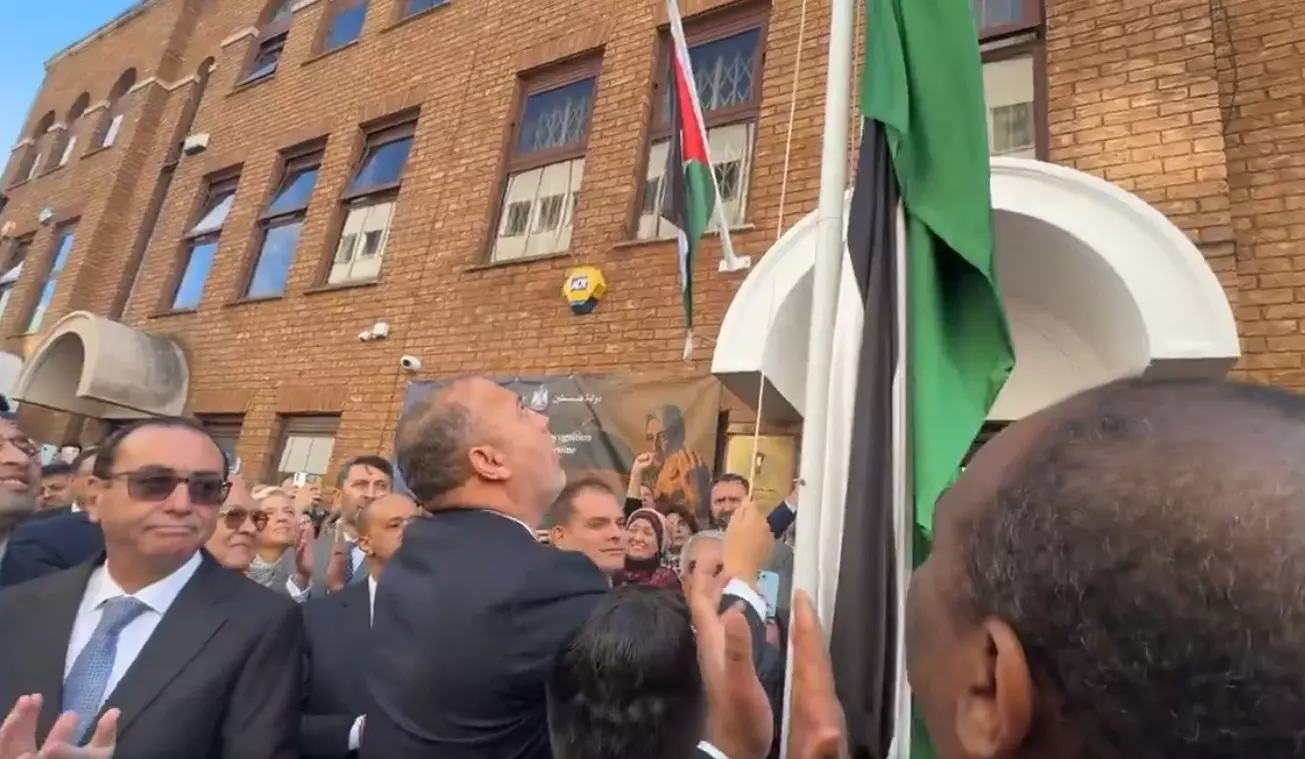
Palestinian flag hoisted in London a day after UK recognises state
UK's decision, made along with allies Australia and Canada, aims to keep alive possibility of a two-state solution amid Israel's opposition; France to join soon

A day after the UK — along with Australia, Canada, and Portugal — confirmed that it was formally recognising a Palestinian state, the Palestinian flag was raised outside the premises of the newly-recognised Palestine’s embassy to the UK in London on Monday (September 22).
The flag-raising ceremony followed a speech by Palestine’s Ambassador to the UK, Husam Zomlot, who called on people to remember “that this recognition comes at a time of unimaginable pain and suffering as a genocide is being waged against us — a genocide that is still being denied and allowed to continue with impunity”.
France, which, like the UK, is one of the five permanent members of the UN Security Council, will pledge to recognize a Palestinian state at this week’s UN General Assembly. More countries are expected to do so as well.
Also read: India votes in favour of UN resolution backing Palestine's statehood
‘Not a reward for Hamas’
The coordinated initiative from the Commonwealth nations and long-time allies of Israel — despite vociferous opposition from the latter and the US — reflects growing outrage at Israel’s conduct of the war in Gaza and the steps taken by the Israeli government to thwart any efforts to create a Palestinian state, including by the continued expansion of settlements in the West Bank.
British Prime Minister Keir Starmer, who has faced pressure to take a harder line on Israel within his own governing Labour Party, said in a video statement Sunday: “In the face of the growing horror in the Middle East, we are acting to keep alive the possibility of peace and of a two-state solution.”
Starmer insisted that the UK’s move was not a reward for Hamas. “We recognised the state of Israel more than 75 years ago as a homeland for the Jewish people. Today, we join over 150 countries who recognise a Palestinian state also. A pledge to the Palestinian and Israeli people that there can be a better future.”
Also read: Israel launches major Gaza City offensive amid UN genocide claim
Coordinated international effort
The announcement was widely anticipated after Starmer said in July that the UK would recognise a Palestinian state unless Israel agreed to a ceasefire in Gaza, allowed the UN to bring in aid and took other steps toward long-term peace.
Australian Prime Minister Anthony Albanese said in his statement that the three announcements Sunday were “part of a coordinated international effort to build new momentum for a two-state solution.”
Palestinian President Mahmoud Abbas has welcomed Britain’s announcement, stressing that it constitutes an important and necessary step towards achieving a just peace in accordance with international law.
The Palestinian head of mission in the UK Husam Zomlot told the BBC that recognition would right a colonial-era wrong. “The issue today is ending the denial of our existence that started 108 years ago, in 1917,” he said. “And I think today, the British people should celebrate a day when history is being corrected, when wrongs are being righted….”
Also read: Canada recognises Palestinian state ahead of UN General Assembly meet
Why little may change on the ground
Israeli Prime Minister Benjamin Netanyahu’s spokeswoman, Shosh Bedrosian, said the leader considered the manoeuvre “absurd and simply a reward for terrorism”.
Critics, including the US and the Israeli government, which has shown no interest in a two-state solution, have condemned the plans, saying it rewards Hamas for its attack on October 7, 2023. They also argue that it’s an empty gesture given that the Palestinian people are divided into two territories — the West Bank and Gaza — with no recognised international capital.
“It’s significant for France and the UK to recognise Palestine because of the legacy of these two countries’ involvement in the Middle East. But without the United States coming on board with the idea of a Palestine, I think very little will change on the ground,” Burcu Ozcelik, senior research fellow for Middle East Security at London-based Royal United Services Institute, told the AP.
(With agency inputs)

